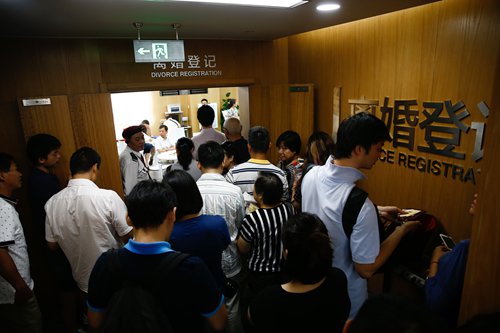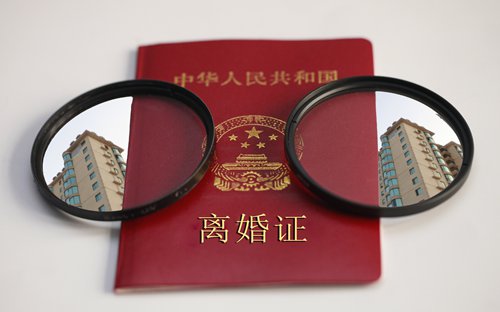Housing in Shanghai is not just shelter. It is also a threshold for getting marriage, a factor in children's schooling qualifications, and, now, a reason to get divorced. Clothes, food, shelter and transportation have long been regarded as the four basic necessities of human life. But our ancestors would never have imagined that shelter would someday become the most unobtainable necessity of them all. Because of the gross imbalance of supply and demand in over-populated urban centers across China, the local housing market has been continuously rising for the past 15 consecutive years.
While many Chinese residents struggle to make even their first down payment on their first-ever apartment, others have more than enough wealth and privilege to take advantage of securing a second or third apartment, often with no intention of actually living in it.
The latter are regarded by the less-fortunate as the primary reason why housing prices have skyrocketed. Adding insult to injury, a policy loophole that allows divorced couples to purchase additional property - and at a lower tax rate - is being viewed by lower-class married couples as the ultimate betrayal of both the institution of marriage and the taxation system itself, which was meant to benefit society as a whole, not just elite families.
Despite their financial ability to purchase more than one apartment in one of Asia's most expensive cities, in fact many of these couples have been placed under extreme emotional turmoil due to the duress of having to make such a life-changing, stressful and risky decision.
The Global Times recently spoke with four such families in Shanghai who divorced just to become qualified for a less costly second or third apartment.

Couples queue up at a divorce registration office in Shanghai in August. Many local couples are reportedly getting "divorced" to purchase additional property - and at a lower tax rate. Photo: CFP
Ms Xu, 42, with a 16-year-old daughter
Both my husband and I were new Shanghainese, which meant we owned no property in the city prior to obtaining our Shanghai hukou (permanent household registration) after we graduated from university as "needed talent" of the city.
We bought our first three-bedroom, two-bathroom apartment in 2001 when the price was extremely affordable, at only 3,500 yuan ($507.73) per square meter. It wasn't hard for us to pay our mortgage.
With stable dual incomes, we thought about buying a second apartment either for our elderly parents or as an investment for our daughter. But we missed many housing purchase opportunities over the past decade, as we misjudged the situation.
Our heads were still stuck in 2001 and we incorrectly believed that China's big property market bubble would burst, which would bring prices back down to more reasonable levels. We kept waiting but it never happened.
In 2012 we moved to another district, where my daughter began her junior high school life. But we found our life quality degraded by having to live in a rented two-bedroom, one-bathroom apartment. Every morning each family member had to wait in line just to use the toilet.
It was not until 2014 that we decided to buy another apartment to improve our living conditions. That is when we had to face all these new housing market policies that added even more costs on top of the purchase price.
For a family's second house, the ratio for a down payment is much bigger than the first, and the interest rate for mortgage loans is also much higher.
What's more, since our two apartments added up to over 180 square meters (according to the current policy, every citizen can only have 60 square meters exempted from property), anything extra will be levied with an annual property tax.
Our real estate agent suggested that, if we divorce, my husband would automatically be qualified to purchase his "first" apartment, which would save us 300,000 yuan, given that I was the primary mortgage bearer on our first apartment. No property tax would be levied, as tax authorities only check second-time buyers.
We never thought we would get divorced just to buy property; we used to mock those who did this. But thinking of saving 300,000 yuan, we made the hard decision.
We dared not tell friends about this, as we regard it as very shameful. We didn't even tell my elderly mother, who lives in the countryside, about our divorce until we became legally remarried after all the property paperwork was completed (the loophole does not require divorced couples to stay divorced).
Our daughter, however, hated us for getting divorced. "Don't do it for my sake!" she screamed. "I will handle all my housing issues myself when I grow up. If you don't have enough money, then just don't buy a new house!"
Sadly, even though we now own two properties, our divorce has become like a scar on our otherwise perfect 17-year marriage.
Ms Yu, 35, with a 5-year-old daughter
Before my marriage, my mother bought me an apartment in Shanghai with my name on the property registration. After I got married, my husband and I rented it out and then bought a 200-square-meter home in 2008 for us and our child to live in.
We later spent two months searching for a suitable apartment inside a key school district for my daughter. But after doing so, we found out that, according to the latest policy, we were not allowed to buy any additional property as a couple. So we divorced.
We haven't resumed our marriage yet either, as on the one hand, both of us are very busy with work, and on the other hand, we love and trust each other so much that we are not in a hurry. We don't regret doing this. It was purely a financial strategy.

A policy loophole that allows divorced couples to purchase additional property - and at a lower tax rate - is being viewed by lower-class married couples as the ultimate betrayal of both the institution of marriage and the taxation system itself. Photo: CFP
Ms Qi, 42, with a 16-year-old son
My husband works in Hangzhou. I used to work and live in Shanghai alone with our son in an apartment in Pudong New Area that we bought in 2002. But several years ago I found a new job in Hangzhou so that my son and I could reunite with my husband.
We sold the Pudong apartment and bought a smaller one in Minhang district so that my son and I could keep our Shanghai hukou. Once we moved to Hangzhou, we made another property purchase there.
When my son entered senior middle school, we decided to move him back to Shanghai so that he could benefit from the city's superior education system. Our small apartment in Minhang was too far away from my new job in Baoshan district and my son's school in Pudong. We had to move again.
During the selling and buying process, we discovered that, as a family unit, we already have three housing purchases on record. It was thus legally impossible for us to buy a fourth home even if we sold the Minhang apartment.
But housing prices were rising at such an insane rate that we really started to worry that we would miss an affordable entry point.
Divorce was the only way for us to buy another apartment. So we took swift action and, following our divorce, succeeded in buying our fourth home, in Baoshan. We haven't resumed our marriage yet - nor have we ever told our son about it. It's nothing good.
Mr Wu, 33, with a 30-month-old daughter
I don't have a Shanghai hukou but my wife has one. According to the current property policy, we were not allowed to have a second apartment in Shanghai.
But we wanted to buy a key school district apartment for our daughter to guarantee her a good education in the future.
My wife and I were university classmates. We trust each other quite a lot although we have only been married for four years. From the very beginning we planned to "divorce" so that we could make this important purchase. Once we bought the apartment, we immediately remarried at the civil affairs bureau.
It was nothing emotional, just a procedure. The city's policy forced us to. I don't mind telling others about this. Both of our 92-square-meter apartments are now in Yangpu district.
A good education is the single most important thing for the next generation, so we did what we had to do.
Unwilling to remarry
An interviewee who originally said that he was unwilling to remarry his wife following their housing divorce ultimately decided against granting this Global Times reporter an interview, for privacy concerns. So instead we decided to further research the reasoning and statistics behind such unusual instances.
Psychologist Lin Yizhen told the Global Times that although many couples use divorce as a financial strategy and then resume their marriage after the purchase, there are still a number of couples who stay divorced.
Lin said that those couples are guided by what she calls "optimistic bias or unrealistic optimism," meaning that they chose to believe that they had nothing to lose by agreeing to get divorced and that everything would return to normal.
She, however, said that it is "not recommendable" for couples to divorce just to buy property, as you can never tell when one spouse is planning something deceitful against the other. Those who do not have a solid foundation in their marriage based on love and respect are especially susceptible to collapse.
Lin's viewpoint was echoed by Yang Yanhui, a partner at Shanghai's Huiye Law Firm, which handles lawsuits between divorced couples. Yang confirmed that it has become quite a common practice for Shanghai hukou couples to divorce to save money on their second housing purchase.
However, Yang pointed out that the number of lawsuits related to housing divorces has also been on the rise. Every divorce certified by the civil affair bureau is legally effective, which makes certain wealthy individuals targets by greedy spouses who had ill intentions from the outset.
To minimize risks and disputes and protect both sides from being taken advantage of, Yang said that even if a couple agrees on a temporary "fake" divorce, it would be better for both sides to make detailed agreements concerning the specific ownership of their property, cash and other possessions.

